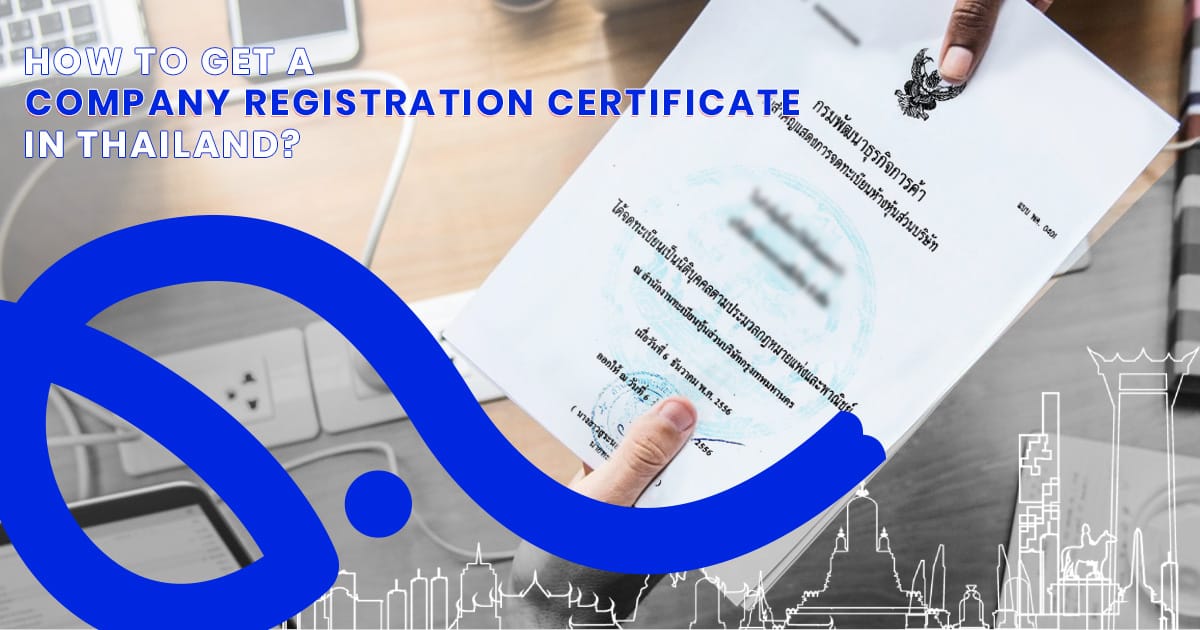Your legal right to conduct business in Thailand is confirmed by your Company Registration Certificate in Thailand. However, you qualify to receive a certificate in Thailand following successful registration. There is a significant growth in the volume of Thai business registrations due to the country’s expanding economy and advantageous geographic location. Moreover, due to government’s support and incentives, foreign businessmen and investors prefer this country. Additionally, Thailand is at an excellent location in Asia, has effective policies, and enjoys social and political stability.
You must complete the registration process wherever you choose to start a business. And, Thailand is no exception. The main objective is constant – submitting the required paperwork, going through the process, and registering. Moreover, Thailand does not charge a very high registration fee for businesses. With the right advice and consulting, you can quickly register your business. Once registered, you are eligible for the services the Thai government offers to businesses.
Why You Will Need Company Registration Certificate in Thailand?
If your company is operating in Thailand, the public must be able to reach you. Therefore, you must let everyone know that you are operating legally in Thailand. Your legal registration to conduct business in Thailand will be attested to by the certificate. Additionally, your Company Registration Certificate will be the only acceptable proof of the following details of your company in Thailand:
- Date of registration of your company in Thailand
- Company name and address
- Company registration number
- Type of business your company can conduct in Thailand
Furthermore, your Company Registration Certificate in Thailand, as stated earlier, is the most vital evidence of the existence of your business in the kingdom. Additionally, you will need this certificate to apply for the following documents and processes for your business:
- VAT Registration Certificate
- ISO Certification
- Foreign Business License for a Representative or Branch Office
- Corporate Income Tax Registration
- Opening a Corporate Bank Account
Now hopefully, you can understand the importance of Company Registration Certificate in Thailand. It is all you need to reinforce your new business in Thailand with all types of documentation and licensing.
How to Get a Company Registration Certificate in Thailand?
The only method to get a Company Registration Certificate in Thailand is to proceed for company registration in Thailand. You will have to register your business in Thailand in accordance with the Foreign Business Act, if you are a foreigner. Let us briefly explain to you the process of Company Registration in Thailand.
You have to follow the nation-specific procedures if you want to start a business in your home country or any other foreign country. It differs everywhere. However, there are some nations where the procedure is the same. The most important details to be aware of are generally as follows:
- Preparing company name
- Finding out if the name is available
- Collect all relevant documents
- Fill up form in designated offices
- Submit all the forms and documents to the designated offices
After you are through all the mentioned steps, you will be able to operate in Thailand. Henceforth, it is now that you will get your Company Registration Certificate in Thailand. The certificate will hold your business registration number through which the government will monitor your company.
In due course of your business operation in Thailand, if you ever have to change your company’s name and/or address, you will have to visit the Department of Business Development for this. Henceforth, they will verify the authenticity of the reason for the change you are requesting for. Furthermore, they certify the change. However, you must ensure that your Company Registration Certificate gets updated with the new name and/or address.
Process of Company Registration in Thailand
Get the comprehensive guide for Company Registration in Thailand by clicking this line. However, we are briefing you with the process as well.
In Thailand, as a foreigner, you are legally permitted to have a company of the following structures:
- A Private or Public Limited Company
- A Partnership / Limited Thai Partnership
- Thai Representative Office or Branch Office
Although there are some technical differences in setting up the companies in the said structures, yet the basic requirements are the same. Therefore, you will have to go through the following steps to register any type of business structure in Thailand:
- Company name search
- Registration of the company name
- Prepare and submission of Memorandum of Association
- Prepare and submission of Article of Association
- Fixing a Statutory Meeting
- Submission of necessary documents for company registration
- Registering for VAT or Tax
The Bottomline
The formation of a Thai Limited Company is the most advantageous and preferred option for starting a new foreign-owned company in Thailand. Primarily, this is due to the following vital reasons:
- There are policies to protect foreign investment
- Easy Process of Business Registration that can be accomplished in few days
- The process strongly supports foreign work permits.
A BOI Company is the second most common business setup for foreigners in Thailand. The Thai government actively promotes it and offers significant benefits, including tax privileges, 100% foreign ownership, land ownership, and many other things.
Therefore, to avail the benefits of the proactive and investor friendly policies of the Thai Board of Investment or the Department of Business Development, you must consult a Thai Business Consultant. Additionally, you can email us your business idea and requirements at officer@konradlegal.com.



